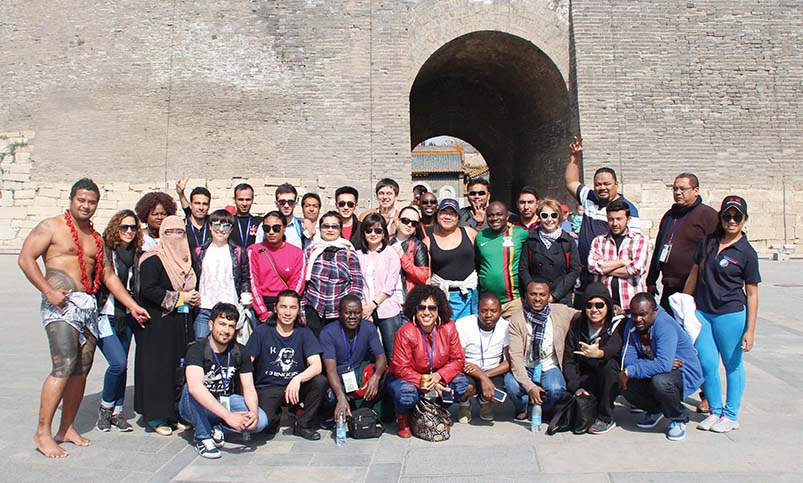My Story With China, reflects Peter Chikwampu
Notice: Undefined index: catFilterList in /home/zambi/public_html/wp-content/plugins/wp-likes/api.php on line 243

MEDIA practitioners from 16 at 2016 Seminar for New Media Journalists in China – Zambia Daily Mail (ZDM)
By Peter Chikwampu
In a bid to enhance international cooperation and open itself up to the world, the People’s Republic of China (PRC) has for several years been organising and hosting capacity-building training seminars for different professions and fields, for both developed and developing countries. Many scholars, professionals and academicians have benefited from these educative, informative and mind-opening seminars in China over the years, and I am no exception.
In 2017, I attended one of these seminars, from 29 September to 19 October, together with two other Zambians. The training seminar was for leaders of Local Governments from English-Speaking African Countries, sponsored by the Ministry of Commerce of the PRC and organised by the Jiangxi College of Foreign Studies. It was held in Nanchang City of Jiangxi Province and featured major lectures held at Yao Lake Pearl Hotel, with field visits around the Province and other towns of the country.
It was interesting to get in-depth insight into this subject matter, as I had a number of questions on my mind about the roles or misrules of some local governments in entrepreneurship and economic development in the Mainland of China and the connection with other developing countries, especially in Africa. So by participating in this training seminar, which is one of the cultural exchange programmes China offers, many of my questions were answered, through sharing ideas and observations on the subject among the lecturers and participants.
“Being part of this training seminar, my mind has been to international connections and personal capacity building in the field of cooperation with the knowledge acquired from the lectures, and the experiences shared among participants both in class sessions and off class interactions. I feel the responsibility to play a vital role in international cooperation.”
The other participants came from Malawi, Sierra Leone, South Sudan, Sudan, Gambia, Ghana, Nigeria, Zimbabwe, Tanzania and Uganda. About two-thirds of participants were from local government (city or municipal staff, Members of National Assemblies, Permanent Secretaries and officials of political parties), while one-third came from civil society organizations working closely with local government institutions.
I recall some of the topics in this seminar were interesting in how they inter-related, and held the attention of the mind as they focused on the understanding China’s local government administration and its reforms.
These topics included the understanding of principle governance of local government administration of China; the involvement and promotion of working as a team in a bid to develop the nation at individual, family, community, civic, professional, religion and cultural levels; the encouragement to achieve things by themselves, in order to solve certain social and economic problems. Those tasks and functions that they cannot handle and manage are then assigned to the next higher level body, in this case, the local government. If those tasks cannot be handled more efficiently by local governments, then central or national government intervenes.
In other ways, functions that can be done at the lowest and most basic units or levels of citizen administration should be done there. Only when the lower levels cannot handle those tasks more efficiently will higher levels of administration be created and mobilized.
Decentralization was another topic which related to the above principle, functions that can be done at the lower levels should be delegated there, since they know the specific and local conditions more than those in the higher levels. The process of decentralization is from the central government level down to state or regional level, to provincial or city and municipal level, down to the village level.
Funding for local operations was also up for discussion, as it is important that local governments should have their own funding, separate from those funds transferred to them by the central or national government, in order to assert their own political and economic independence. Even so, for China central government plays a big part in the funding of local governments. Despite central government having a stake in their funding, there are various revenue streams available to local governments, including real estate and other local taxes, shared taxes among neighbouring cities and municipalities, various fees and contributions, income from business activities, the sale of local assets, as well as loans and grants.
Chinese Civil Society is not left out in participating in the development of its locality. This is aside from local governments having a major role in the administration at their levels. The citizens and their voluntary associations, enterprises and other organizations can participate in the administration but with consent from central government, which must approve and fund the organisations for their operations.
Our training brought out the effectiveness of the open door policy vis-à-vis fast economic development of China and the benefits of other developing countries, especially those in Africa. Citizen Social Warfare and Inclusiveness of the citizens in the development is crucial, especially in infrastructural and manufacturing sectors, so as to grow the economy. The value of cultural and traditional norms was also discussed, in relation to the development of the tourism sector.
In addition, the impact of the “Belt & Road Initiative” on global economic platforms and the effectiveness in the promotion of foreign policy vis-à-vis investment – all in all the effectiveness of the administration of a unitary state.
“By the design of the training programme of having different participants from other countries in Africa, I have grown my international network base, some of which I am still communicating with, sharing ideas and doing business in one way or another, as we have to be the change we want to see in this world. That means personal, community, national and global development. I don’t think I would be able to do that without having participated in this training seminar.”
From this seminar I am still in touch with colleagues from Sierra Leone, and Nigeria, with whom I share projects related to the seminar topics and other personal businesses. From the Chinese side I have also spread my network to the other towns such Guangzhou, where I have connected business people to good leads of suppliers and some companies in Chengdu have appointed me as their Authorised agent to help them with communications to their clients and business start-ups, search for business information and country laws guidance among other services required.
Apart from having known a lot about China in theory, the training seminar programme did as well include visits that related to “Local Government Administration and Operations”. As a participant this is what I expected, visit to one of the Local Government centred institutions and departments such as Council, Municipal Council or a Department in the Central Government that deals directly with Local Government affairs. And theory equalled practice at the end of it.
Aside from these formal lessons during the seminar, I also learned a few minor but important lessons as a participant.
Our seminar moderators as well as other Chinese resource persons emphasized much on punctuality, although some participants never adhered to the instructions given. If they set a lecture at 9 am, it is 9:00 and not 9:01 am or later. The organising team was however lenient enough to allow late arrivals by waiting for latecomers without any valid reason. During our field trips to the countryside, instructions were that the bus will leave at a particular time, everyone was inside the bus, apart from a few who were late, leading to a few moments of re-counting the participants.
In the initial training stage we were treated to a light service of learning the simple Chinese language so that as participants we can use it in their daily vocabulary in incidences of shopping and need of necessities with college staff. The lesson were also characterised by the practice of writing Chinese characters and singing of a famous Chinese folk song “Jasmine” flower. The use of chopstick game was among the practices. This part of the training removed stress and boredom and it helped us settle well in the training.
As one saying goes “a visit to a foreign country without having a feel of its culture and touristic attractions is not a visit”, and the organisers of this seminar did not forget this aspect.
The visits gave me more insight into China’s tradition, culture and tourism. This opened my mind to the importance of preserving culture and telling the country’s own history. These visits were made in Wuyuan, which has the highest production of porcelain products in the country.
Beijing, an administration city harbouring the famous Great Wall and Historical Forbidden City, offered fascinating sites to learn more about Chinese history, and Shanghai, an economical city displayed the most amazing tall buildings (skyscrapers) one would ever think of finding.
“China has a marvel of infrastructure to admire.” The civilisation and industrialisation the country has gone through is evident by the existence of massive technology, manufacturing and processing industries around the country, both at small and large scale levels, giving China a “loud” economy pronouncement. Coming to the food, I enjoyed more of the Beijing (Peking) Roasted Duck, Sweet and Sour Pork, Noodles with prawns, Egg-Fried Rice and the manchow soup going down well with Chinese made beverages.
I would like to commend Jiangxi College of Foreign Studies for the cultural exchange programmes organised, and also for allowing participants to tell their experiences, as it shows coordination and relevance of recognition to participants who learn from China, and can implement what they learned upon returning to respective countries and workplaces. I think this way it would be a true win-win situation unlike ending the road after the China training seminar ends. I thank the Chinese authorities through the Embassy in Zambia for according me the opportunity to be part of the 2017 training seminar.
The Author is an International Relations Advocate and Journalist.
+260977773757 peter@africamail.com






















